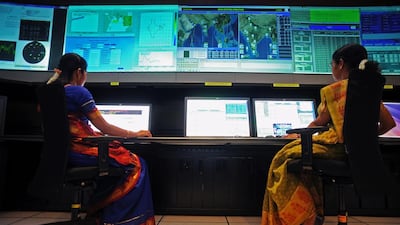India has developed a sophisticated space technology system over the past few decades that plays a significant role in sectors ranging from agriculture to medicine.
The Indian Space Research Organisation (ISRO) has launched more than 70 satellites since the space programme was set up in 1969 “for various scientific and technological applications”, including “mobile communications, meteorological observations, telemedicine, tele-education, disaster warning, radio networking, search and rescue operations, remote sensing and scientific studies of the space”, it says.
India’s space programme now costs US$1 billion a year.
The Indian national satellite (Insat) system, commissioned in 1983, is a multipurpose satellite communications system used for a range of functions including television broadcasting and meteorological imaging. It plays a vital role in delivering cyclone warnings and is used in search and rescue operations.
The satellites are also used for “telemedicine”, connecting speciality hospitals in India’s major cities to hundreds of hospitals in rural and remote areas of the country, as well 18 mobile units with satellite dishes that link it up to the system.
“India has established space systems that form an important element of the national infrastructure,” the ISRO says.
It adds India also has “the world’s largest constellation of remote sensing satellites”.
“The data is used for several applications covering agriculture, water resources, urban development , mineral prospecting, environment, forestry, drought and flood forecasting, ocean resources and disaster management,” the ISRO says.
Susmita Mohanty, the co-founder and chief executive of Earth2Orbit, which is India’s first private sector space company, says while it is important the country continues with its development of such pragmatic uses of its space technology, it would need to privatise activities such as satellite and rocket building to be able to grow the industry more effectively and compete internationally.
“Last year, the ISRO chairman announced the government’s intention to outsource routine satellite manufacturing and the assembly of one of India’s two rockets – the mature, highly reliable Polar satellite launch vehicle – to the Indian industry by 2017,” says Ms Mohanty,
“I’d love to see this happen. It is an important step towards commercialising India’s space capabilities and eventually making it a global market player.”
India’s first spacecraft mission to the Moon, Chandrayaan-1, was successfully launched on October 22, 2008. The mission resulted in the discovery of water molecules on the surface of Earth’s nearest neighbour. India was the fourth single country to send a probe to the Moon.
Through its first Mars mission, launched on November 5, India is hoping to gather data on the Red Planet’s weather systems as well as searching for methane.
“India has established a strong infrastructure for realising its space programme,” the ISOR says.
“They include facilities for the development of satellites and launch vehicles and their testing; launch infrastructure for sounding rockets and satellite launch vehicles; telemetry, tracking and command network; data reception and processing systems for remote sensing.
“A number of academic and research institutions as well as industries participate in the Indian space Programme. Several Indian industries have the expertise to undertake sophisticated jobs required for space systems.”
It seems the country is not merely shooting at the Moon.
business@thenational.ae

